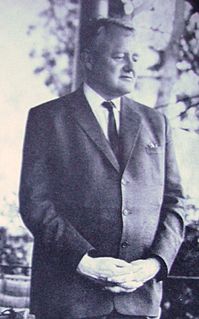In Judaism, the Holy Spirit is the divine force, quality, and influence of God over the Universe or over his creatures. In Nicene Christianity, the Holy Spirit or Holy Ghost is the third person of the Trinity. In Islam, the Holy Spirit acts as an agent of divine action or communication. In the Baha’i Faith, the Holy Spirit is seen as the intermediary between God and man and "the outpouring grace of God and the effulgent rays that emanate from His Manifestation".
Philosophy of religion is "the philosophical examination of the central themes and concepts involved in religious traditions". Philosophical discussions on such topics date from ancient times, and appear in the earliest known texts concerning philosophy. The field is related to many other branches of philosophy, including metaphysics, epistemology, and ethics.
Religion and mythology differ in scope but have overlapping aspects. Both terms refer to systems of concepts that are of high importance to a certain community, making statements concerning the supernatural or sacred. Generally, mythology is considered one component or aspect of religion. Religion is the broader term: besides mythological aspects, it includes aspects of ritual, morality, theology, and mystical experience. A given mythology is almost always associated with a certain religion such as Greek mythology with Ancient Greek religion. Disconnected from its religious system, a myth may lose its immediate relevance to the community and evolve—away from sacred importance—into a legend or folktale.
Theology is the systematic study of the nature of the divine and, more broadly, of religious belief. It is taught as an academic discipline, typically in universities and seminaries. It occupies itself with the unique content of analyzing the supernatural, but also deals with religious epistemology, asks and seeks to answer the question of revelation. Revelation pertains to the acceptance of God, gods, or deities, as not only transcendent or above the natural world, but also willing and able to interact with the natural world and, in particular, to reveal themselves to humankind. While theology has turned into a secular field, religious adherents still consider theology to be a discipline that helps them live and understand concepts such as life and love and that helps them lead lives of obedience to the deities they follow or worship.

Religious studies, also known as the study of religion, is an academic field devoted to research into religious beliefs, behaviors, and institutions. It describes, compares, interprets, and explains religion, emphasizing systematic, historically based, and cross-cultural perspectives.

Jesus is the Son of God and in mainstream Christian denominations he is God the Son, the second Person in the Trinity. He is believed to be the Jewish messiah who is prophesied in the Hebrew Bible, which is called the Old Testament in Christianity. Through his crucifixion and subsequent resurrection, God offered humans salvation and eternal life, that Jesus died to atone for sin to make humanity right with God.

A parody religion or mock religion is a belief system that challenges the spiritual convictions of others, often through humor, satire, or burlesque. Often constructed to achieve a specific purpose related to another belief system, a parody religion can be a parody of several religions, sects, gurus, cults, or new religious movements at the same time, or even a parody of no particular religion – instead parodying the concept of religious belief itself. Some parody religions emphasise having fun; the new faith may serve as a convenient excuse for pleasant social interaction among the like-minded.
The existence of God is a subject of debate in theology, philosophy of religion and popular culture. A wide variety of arguments for and against the existence of God or deities can be categorized as logical, empirical, metaphysical, subjective or scientific. In philosophical terms, the question of the existence of God or deities involves the disciplines of epistemology and ontology and the theory of value.

Foolishness for Christ refers to behavior such as giving up all one's worldly possessions upon joining an ascetic order or religious life, or deliberately flouting society's conventions to serve a religious purpose—particularly of Christianity. Such individuals have historically been known as both "holy fools" and "blessed fools". The term "fool" connotes what is perceived as feeblemindedness, and "blessed" or "holy" refers to innocence in the eyes of God.
Inclusivism is one of several approaches in religious studies, anthropology, or civics to understand the relationship between different religions, societies, cultures, political factions etc. It asserts that there is beauty in the variety of different schools of thoughts, and that they can live together in harmony. It stands in contrast to exclusivism, which asserts that only one way is true and all others are in erroneous.

Antony Garrard Newton Flew was a British philosopher. Belonging to the analytic and evidentialist schools of thought, Flew worked on the philosophy of religion. During the course of his career he taught at the universities of Oxford, Aberdeen, Keele and Reading, and at York University in Toronto.
Exclusivism is the practice of being exclusive; mentality characterized by the disregard for opinions and ideas which are different from one's own, or the practice of organizing entities into groups by excluding those entities which possess certain traits.
The New Thought movement is a spiritual movement that coalesced in the United States in the early 19th century. New Thought was seen by its adherents as succeeding "ancient thought", accumulated wisdom and philosophy from a variety of origins, such as Ancient Greek, Roman, Egyptian, Chinese, Taoist, Vedic, Hindu, and Buddhist cultures and their related belief systems, primarily regarding the interaction between thought, belief, consciousness in the human mind, and the effects of these within and beyond the human mind. Though no direct line of transmission is traceable, many adherents to New Thought in the 19th and 20th centuries claimed to be direct descendants from those systems.

Russell's teapot is an analogy, formulated by the philosopher Bertrand Russell (1872–1970), to illustrate that the philosophic burden of proof lies upon a person making empirically unfalsifiable claims, rather than shifting the burden of disproof to others.
Criticism of atheism is criticism of the concepts, validity, or impact of atheism, including associated political and social implications. Criticisms include positions based on the history of science, philosophical and logical criticisms, findings in both the natural and social sciences, theistic apologetic arguments, arguments pertaining to ethics and morality, the effects of atheism on the individual, or the assumptions that underpin atheism.
The problem of religious language considers whether it is possible to talk about God meaningfully if the traditional conceptions of God as being incorporeal, infinite, and timeless, are accepted. Because these traditional conceptions of God make it difficult to describe God, religious language has the potential to be meaningless. Theories of religious language either attempt to demonstrate that such language is meaningless, or attempt to show how religious language can still be meaningful.

Per Arvid Ingemar Hedenius was a Swedish philosopher. He was Professor of Practical Philosophy at Uppsala University (1947–1973). He was a famous opponent of organised Christianity. The Swedish Humanist Association, known in Sweden as "Humanisterna", offers the Ingemar Hedenius Award each year to support humanist ideas and critical thinking.

The Dawkins Delusion? Atheist Fundamentalism and the Denial of the Divine is a book by the theologian Alister McGrath and the psychologist Joanna Collicutt McGrath. It is written from a Christian perspective as a response to arguments put forth in The God Delusion by Richard Dawkins. The work was published in the United Kingdom in February 2007 by the Society for Promoting Christian Knowledge and in the United States in July 2007.
Basil George Mitchell was an English philosopher and at one time Nolloth Professor of the Philosophy of the Christian Religion at the University of Oxford. Mitchell argued for the place of religious belief in public debate and criticized liberal humanism.
The term Protestant ecclesiology refers to the spectrum of teachings held by the Protestant Reformers concerning the nature and mystery of the invisible church that is known in Protestantism as the Christian Church.







